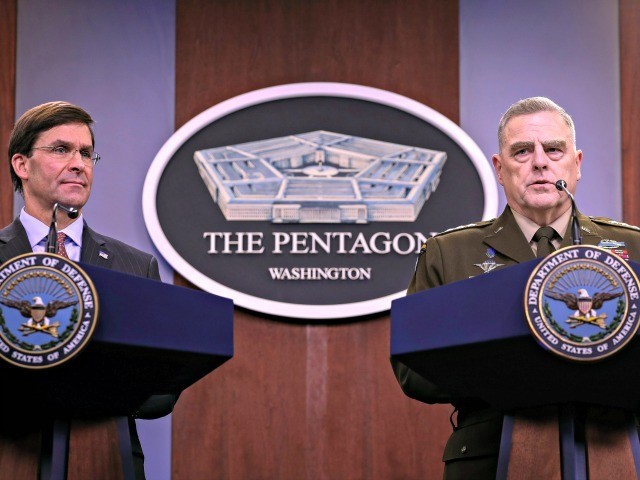Pentagon leaders on Monday defended the U.S. military strike President Trump ordered against Iranian terrorist leader Qasem Soleimani on January 2, saying that intelligence showed he was planning “imminent” combat operations against U.S. military forces in the region.
Army Gen. Mark Milley, chairman of the Joint Chiefs of Staff, told reporters at the Pentagon:
I’ll stand by the intelligence I saw that was compelling, it was imminent, and it was very very clear in scale and scope. Did it exactly say who, what, when, where? No. But he was planning, coordinating and synchronizing significant combat operations against U.S. military forces in the region and it was imminent.
“Those of us who were involved in the decision-making of that, we would have been culpably negligent to the American people had we not made the decision we made,” he added.
Milley also pushed back against reports claiming the intelligence justifying the strike against Soleimani was “razor-thin.”
“Very, very few people saw the intelligence,” he said. He added he would be happy at the “appropriate time” to testify to Congress about it.
Critics of the Trump administration have accused the president of not thinking through the consequences of the strike against Soleimani. Trump decided on the strike after Iran-controlled Shia militia forces attacked the U.S. Embassy in Iraq.
However, both Milley and Defense Secretary Mark Esper said they were well aware of the risks and that it was necessary to protect American lives.
“We had a responsibility to act when American lives are threatened and I think that’s a responsible thing to do,” Esper told reporters. He continued:
When we looked at this operation, we knew there’d be consequences, we knew there would be risks. We knew that ahead of time. We didn’t take any of it lightly. And the forces….we knew we would have to adjust their posture, force protection posture in the immediate aftermath of this particular strike operation.
A report earlier in the week claimed that the Pentagon gave the president the option to kill Soleimani not intending for him to choose it. Esper suggested that reporting was false.
“We didn’t put any option on the table that we didn’t believe in, and that we knew we couldn’t execute,” he said.
Esper vigorously defended killing Soleimani:
How do you expect us not to respond after they’ve been killing our people for 20 years? Soleimani alone has the blood of hundreds of Americans. He’s wounded thousands of Americans and coalition partners. … He is a terrorist, a leader of a terrorist organization, he’s been killing and attacking Americans for 20 something years, and the blood is on his hands. He was planning attacks on American forces. He was there on the ground with the leader of Khata’ib Hizbollah — met him on the ground at the airplane, welcomed him, so they could further coordinate attacks.
This whole narrative that’s being turned around is silly.
Esper said the U.S. will continue to deploy and reposition forces throughout the region for their security and protection, and to be prepared for any contingency. He said he has spoken with many allies and partners and has received “uniform support for our position and for our actions.”
He also said the ball is now in Iraq’s court, and encouraged them to “deescalate the situation.” He said:
We are open to sitting down with them and discussing issues, that we could have a more normal relationship with that country. We’ve been saying this for quite some time now. I’ve conveyed that to our partners and our allies and I’ve asked them to convey that as well to Iran.
“But with that said, if Iran chooses to go the other path, we are completely prepared for that too, and will respond forcefully.”
Esper and Milley also made clear there were no plans for U.S. troops to leave Iraq, despite the draft of a letter that was mistakenly released on Monday. Esper said:
There’s been no decision made to leave Iraq, period. There’s no decision to leave, nor did we issue any plans to leave or prepare to leave. We’re committed to the D-ISIS mission in Iraq, alongside our allies and partners.
“I think the Iraqi people don’t want us to leave. They know that the United States is there to help them become a sovereign, independent, prosperous country. That is not the intentions of Iran. Iran wants to control them as a proxy state … There are many Iraqi lawmakers who feel the same way,” he added.
Follow Breitbart News’s Kristina Wong on Twitter or on Facebook.

COMMENTS
Please let us know if you're having issues with commenting.